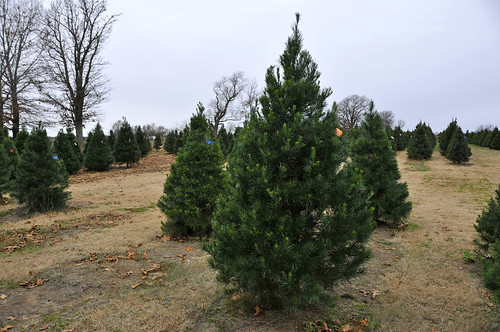Real Christmas trees: A growing trend
By Emily Thompson
U of A System Division of Agriculture
Dec. 14, 2016
Fast facts:
- The number of real Christmas trees purchased from choose-and-harvest farms has increased in Arkansas and in the U.S.
- Agritourism is one of the fastest growing niche tourism markets in Arkansas
(370 words)
(Newsrooms: With 12-12-2016-Ark-Christmas-Tree-Selection, downloadable art at www.flickr.com/photos/uacescomm/30728036453, www.flickr.com/photos/uacescomm/31165075440 )
FAYETTEVILLE, Ark. – While some spent Thanksgiving weekend Black Friday shopping, others went Christmas tree shopping.
During its opening weekend, Wonderland Tree Farm in Pea Ridge, Arkansas, sold more than 700 trees.
“They’re coming out like crazy,” said Jill Babb, who owns the farm with her husband Martin.
By the beginning of December, Martin Babb said his fields were beginning to look picked over. Most of his best trees had already sold.
The empty spaces in Babbs’ field are testament to a national trend that sees 25-30 million real Christmas trees sold each year. Recently, there has been an increase in people getting their trees from choose-and-harvest farms, where people can pick out and cut their own tree.
In 2014, 24 percent of the real trees sold came from choose-and-harvest farms. That number grew to 32 percent in 2015, according to the National Christmas Tree Association.
More than a holiday tradition
According to the U.S. Department of Agriculture’s Census of Agriculture, the number of farms in Arkansas producing Christmas trees went from 29 in 2007, to 59 in 2012. The number of Christmas trees harvested nearly doubled in those years, as well.
Christmas farming is an agritourism attraction.
Agritourism is any activity or attraction that promotes agriculture, including farmers markets and wineries. The $3.6 million industry is one of the fastest growing niche tourism markets in Arkansas, according to Arkansas Industry Insider.
Agritourism gives farmers and ranchers the opportunity to diversify their revenue streams and raise awareness for agricultural production. Communities also see additional revenue, as tourists coming to these attractions often stop in local restaurants and shops.
“It builds a relationship between farmers and consumers,” said Stacey McCullough, interim assistant director of community and economic development of the University of Arkansas System Division of Agriculture Cooperative Extension Service.
In 2011, the Arkansas State Legislature passed the Agritourism Act. The act was meant to promote and encourage agritourism by protecting farmers from liability issues.
Under the bill, the participants in agritourism, not the farmers, assume the inherent risk of engaging in that activity. Inherit risk includes animal behavior, land conditions, the dangers of equipment used in farming and negligent behavior of the participant.
For more information on agritourism, agritourism events or how to get started in the field, go to: http://uaex.uada.edu/farm-ranch/special-programs/agritourism.aspx or https://www.facebook.com/arkagritourism.
Pursuant to 7 CFR § 15.3, the University of Arkansas System Division of Agriculture offers all its Extension and Research programs and services (including employment) without regard to race, color, sex, national origin, religion, age, disability, marital or veteran status, genetic information, sexual preference, pregnancy or any other legally protected status, and is an equal opportunity institution.
# # #
Media Contact: Mary Hightower
Dir. of Communication Services
U of A Division of Agriculture
Cooperative Extension Service
(501) 671-2126
mhightower@uada.edu
Related Links
